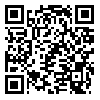BibTeX | RIS | EndNote | Medlars | ProCite | Reference Manager | RefWorks
Send citation to:
URL: http://ijpcp.iums.ac.ir/article-1-411-en.html
Abstract
Objectives: Since individuals with social anxiety disorder experience a high level of anxiety in social situations, and self efficacy in social situations is considered to determine social anxiety, the present study examines the relationship between social self-efficacy, self-focused attention, cognitive biases, and social anxiety.
Method: This is a cross-sectional comparative study. 830 high school students (429 girls and 401 boys) who were selected using random-cluster sampling method completed the following questionnaires: Social Anxiety Scale for Adolescents (SAS-A), Probability/Cost Questionnaire for Children (PCQ-C), Focus of Attention Questionnaire (FAQ) and Self-efficacy for Social Situation Scale (SESS). Data were analyzed using correlation coefficient and regression analysis.
Results: There were significant correlations between social anxiety and social self-efficacy (p<0.001) and self-focused attention (p<0.001). In addition, social anxiety, social self-efficacy and self- focused attention had a significant relationship with the probability (p<0.001) and the outcome (p<0.001) of negative social events and the mediational model was ultimately confirmed. In other words social anxiety was related to social self-efficacy and self-focused attention and therefore with cognitive biases.
Conclusion: Self-focused attention and measures of biased judgments are related to the control of social self-efficacy and social anxiety.
Received: 2008/06/11 | Published: 2008/05/15
| Rights and permissions | |
 |
This work is licensed under a Creative Commons Attribution-NonCommercial 4.0 International License. |



